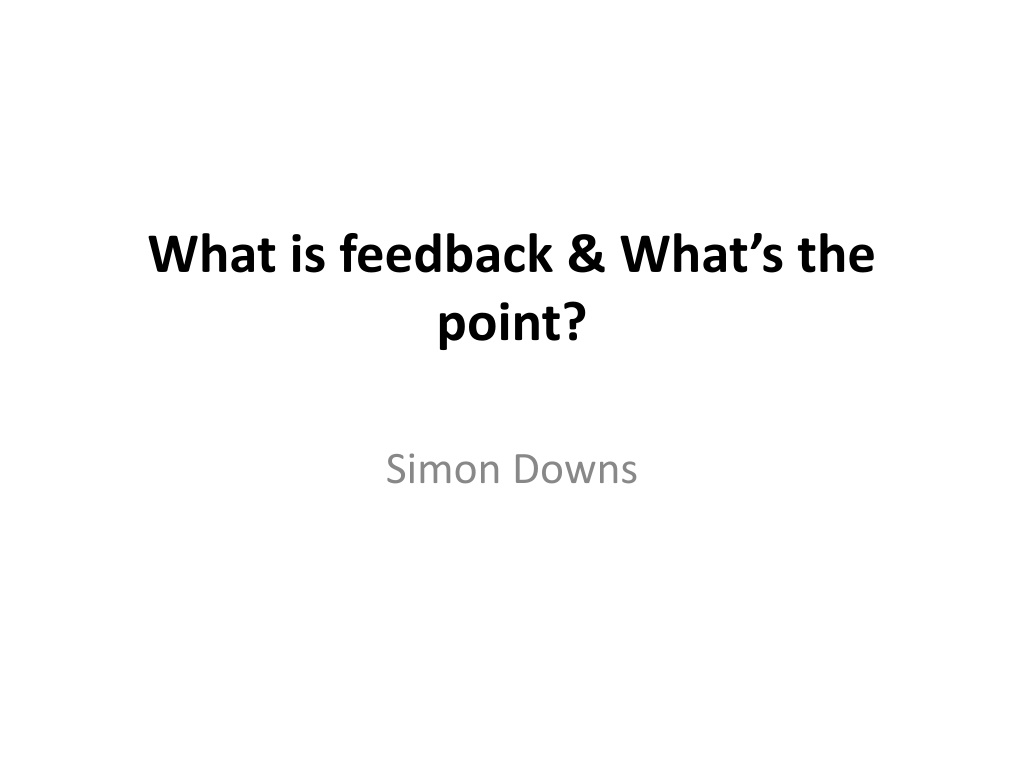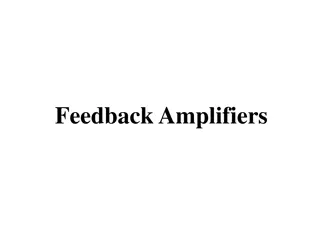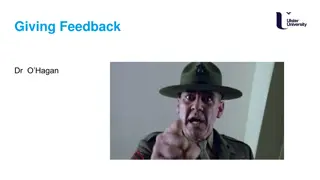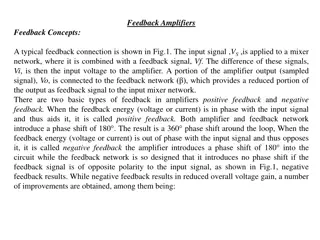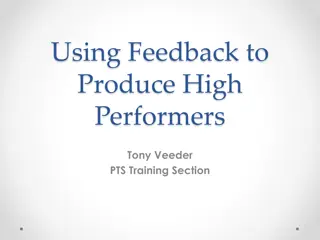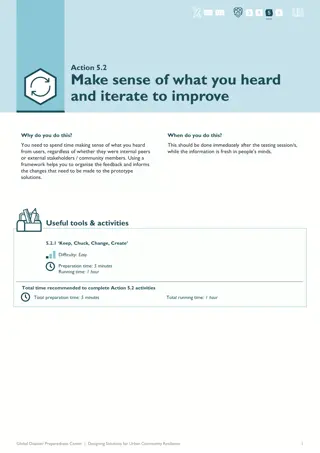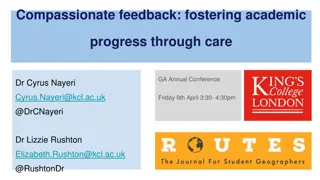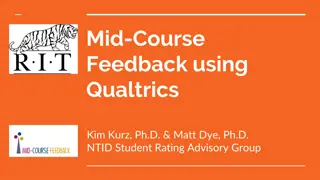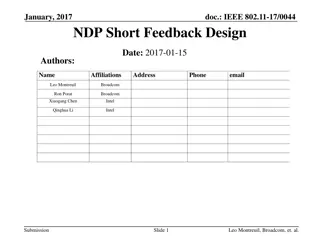Understanding the Importance of Feedback in Learning and Development
Feedback plays a crucial role in providing information about performance or behavior to affirm strengths and improve weaknesses. It helps individuals become consciously competent by identifying areas for improvement through formative assessment. Effective feedback enhances motivation, promotes learning, and empowers individuals to reflect and incorporate new knowledge into practice. Different types of feedback, such as formative assessments and various analyses, contribute to the development of unconscious competence. Utilizing feedback in learning processes can have a powerful impact and foster continuous growth.
Download Presentation

Please find below an Image/Link to download the presentation.
The content on the website is provided AS IS for your information and personal use only. It may not be sold, licensed, or shared on other websites without obtaining consent from the author. Download presentation by click this link. If you encounter any issues during the download, it is possible that the publisher has removed the file from their server.
E N D
Presentation Transcript
What is feedback & Whats the point? Simon Downs
Feedback is about providing information about performance or behaviour with the aim of affirming and/or developing performance or behaviour, i.e. to affirm what you do well to help you develop in areas you do less well
"Improper guidance and feedback are the single largest contributors to incompetence in the world of work, and a principal culprit at school".
Model behaviour Practice Perform Feedback Reflect eventually Unconscious competence
Types of Feedback Formative assessment can identify strengths and also areas of weakness:- not know something. Formative assessment can promote awareness Unconscious incompetence is when learners do not know that they do not know. Formative assessment can promote learning Conscious incompetence is when learners are aware of what they do something. Formative assessment can encourage them to incorporate their learning into practice Conscious competence is when learners know that they know practice that they do not know that they know something. Formative assessment can keep them from lapsing Unconscious competence is when learners are so familiar with their
In addition to telling learners what their needs are and where they are in the learning process, formative assessment can: Tell them when they are ready to learn Enhance their innate motivation to learn Demonstrate a range of strategies and ways of learning Offer the opportunity to reflect on the learning process itself Evidence shows that high quality formative assessment does have a powerful impact on learning.
Video analysis Random Cases Analyses Problem Case Analyses OSCEs can be done in a formative or summative way Significant Event Analyses Prescribing reviews Referral analyses Feedback from other members of the health care team (type 360 degree type feedback into Google) Patient feedback Appraisal Debriefing
Can You Remember a Time When You Were Given Bad Feedback? If we want to figure out how to give good feedback, it is probably a good starting point to figure out how to do it badly. Try and recall feedback (may be at school, college or university or even in the work place) that was awful for you.
Feedback is NOT A negative emphasis: It is a mistake to concentrate exclusively on a person s weaknesses. A "flavour of the month" approach: where everyone is compared to each other in a displayed graphical form respondents are not told the purpose of the exercise, there will inevitably be some who invent their own reasons when responding to constructive comments Poor communication about the purpose: If participants and feedback to be useful it must result in action. There was no action or support, just an evaluation: For
How the Learner May React to Feedback 1. On the person receiving the feedback :- 2. Anger: I ve had enough of this 3. Denial: this reaction often accompanies the initial shock of feedback I cant see any problem with that 4. Blame: It s not my fault. What can you expect when the patient won t listen? 5. Rationalisation: finding excuses to try and justify their behaviour I ve had a particularly bad week Doesn t everyone do this? 6. Acceptance 7 Renewed Action (this is what you are after)
And, as the Giver of Feedback, avoid doing this: 1. Obligation: I m duty-bound to tell you this 2. Stand on Moral high ground: It is for your own good! 3. Bullying and fudging: taking a long time to get to the point and covering many irrelevancies 4. Minimising: Don t worry, it is not such a big deal. Everyone does it at some time 5. Colluding: You re probably right, perhaps I am overreacting
Why do I need to learn about Doing Feedback Effectively? Because feedback can encourage OR discourage behaviour. If given in the wrong way, negative feedback can result in an unpredicatable subsititution or change of behaviour (Tosti, 1986) thus preventing you from what are really trying to achieve.
Do You Relate to Any of These? Some people hold back from giving motivational feedback because: they think that compliments are inappropriate because the trainee is only doing what he or she is paid to do they feel too embarrassed easy .the halo effect they believe that the person receiving the feedback may relax and take it motives they believe that the person receiving the feedback may be suspicious of their compliments in return they think that the feedback may be misinterpreted as a ploy to fish for they don't like receiving motivational feedback themselves
How Do I Give Effective Feedback?..... 1. information: hard facts, concrete data, observable examples of performance and behaviour and NOT personal hunches NOR assumptions! 2. about performance or behaviour (i.e. what the person does and how they do it) and NOT about who they are. 3. a very specific intention, that is, to lead to action. If this does not happen, then there is no point in giving it. 4. This means that before delivering feedback, the deliverer must be clear as to the outcome they wish to see. If this is not clear to the deliverer, what hope has the recipient got? feedback is intended to affirm or develop performance or behaviour.
Some people hold back from giving developmental feedback because: they worry that they might upset the receiver the horns effect they are concerned that the receiver may reject them/reject the feedback feedback his or herself they are concerned that the person might retaliate with developmental to resolve and might damage future relations they are concerned that it may end in a confrontation that would be difficult something more substantial they think that the issue is too trivial, and that it would be better saved for they don't like receiving developmental feedback themselves.
TIMING Check to make sure it is the right time to give feedback Eg if the giver or receiver are in a foul mood or upset about something else in their lives, now might not be a good time. Check! Try and give feedback soon after the event not months later when the receiver can t recall it anymore and it thus becomes a cold topic. Research shows that feedback given immediately after a test-like situation is best. In general, the more delay that occurs in giving feedback, the less improvement there is in achievement be well timed enough time take time and prepare well full attention/no interruptions both people feeling calm if possible, receiver should feel prepared both parties need time don t rush
GET THE FACTS IF IN DOUBT - SHUT UP AND LISTEN TIMING IS CRITICAL
ENVIRONMENT involve mutual goodwill receiver should feel that the giver isn t their enemy giver needs to want to help receiver develop give criticism on neutral territory Need to Alter Beliefs concerning Feedback feedback is a helpful, healthy and positive communication between two people. The purpose of feedback is to maintain and improve performance - it should therefore have both a positive intention and impact. Consequently it is vital that the whole feedback process, whether giving motivational feedback (what has gone well) or developmental feedback (where the individual can improve) is conducted in a positive and constructive way. Fundamental to being able to give effective feedback is the belief that Be encouraging in tone
METHODOLOGY Enuser the receiver can understand the feedback you give so they can act on it. Try and pitch it at the right level. encouraging self-evaluation and reflection . Concentrate on behaviour, not the person. - focus on the problem rather than the person Be Descriptive Be Specific - focus on facts and give examples You don t have to be overinclusive and cover everything. Think and revaluate: have you said enough? The simplest prescription for improving education must be dollops of feedback. Feedback is enhanced by Is enhanced by dialogue which encourages the ability to self-assess. 1. Make space for reflection on both sides - is the feedback leading to better outcome?? If not why not? What is responsible for the hindrance? The key skills are to listen and ask, not, as is often the temptation, to tell and provide solutions. - monitor the relationship periodically; a) giving it? How am I feeling about
CONTENT difference. Don t over do it with negative feedback you may push the learner into defensive and unrevealing mode. Don t forget to provide some positive . Positive feedback generally provides more information than negative feedback and strengthens a student s motivation and self-confidence. Balance the feedback. Only give feedback where it is going to make a an idea of how to change acknowledge the other person s strengths and good points empathise discuss solutions highlight benefits to both parties try to end on a positive note is balanced - positive and negative is specific - with clear facts and examples is descriptive (not evaluative) - how the receiver behaves, not who they are if developmental , refers to something the receiver can change - and offers
Brown & Leighs (1996) Constructive feedback Rules DESCRIPTIVE non-judgemental, based on behaviour not personality BAD: "I think you re selfish in that you don t listen to anyone else GOOD: "I notice that you don t look at people when they are talking to you". Both these comments can apply to the same situation, but the second describes what is happening, whereas the first is judgmental. The second gives information which the other person would find difficult to dispute, but relatively easy to take action on. The first is more likely to provoke a defensive reaction, with little chance of any resultant improvement. SPECIFIC or focussed; In order to focus developmental feedback:- a) avoid personal comments POOR: you fool! Cant you remember that I needed these accounts for the meeting yesterday? GOOD: Shirley, I need the accounts for 2pm on Friday for the management meeting later in the afternoon
b) Avoid Mixed Messages POOR: John, you always look as if you have just got out of bed but patients clearly like you GOOD: John, can I be so bold as to suggest you take more effort with your appearance in order to make a better impression? I m just think what first impressions patients might make what do you think? c) Avoid diffusion POOR: You re not very good at relating to patients. You have to improve. GOOD: Richard, do you think your difficulty with patients might be because you need to identify their ideas and concerns a bit more?. Can we talk about it & work out some plans to improve? DIRECTED towards behaviour that can be changed. Feed back on observed behaviour and a way of doing this is to focus on what the individual has said or done; don't make subjective judgements. POOR: why the poker face? You always look miserable GOOD: I m wondering if you smiled a bit more, patients might engage more?
TIMELY given as close to the event as possible (taking account of the person s readiness etc) SELECTIVE addressing one or two key issues rather than too many at once SUGGESTIONS rather than PRESCRIPTIONS feedback should be in the form of suggestions rather than prescriptive comments) I wonder if . ; Do you think it might have been helpful if .. ; Have you any thoughts on . ; What if .. what do you think?
PENDLETONS RULES FOR FEEDBACK Pendletons (1984) rules of Feedback 1. strengths 2. The trainer reinforces these and adds further strengths The trainee is asked to start by identifying his or her own 3. The trainee is asked to identify areas for improvement 4. This structure works on the simple principle of an emotional bank balance: that withdrawals cannot be sustained without credits in place first. The trainer reinforces these, adding further areas if necessary
THE SET-GO METHOD OF DESCRIPTIVE OUTCOME BASED FEEDBACK OBJECTIVE Group members to base their feedback on: 1 What I Saw Facilitator to prompt if necessary with either or both of: 1 what Else did you see NOTES descriptive, specific, non - judgmental what happened next in descriptive terms reflecting back to the doctor on the video who is opportunity to acknowledge and problem solve himself 2 what do you Think John? then given an Facilitator then to get the whole group to problem solve 1 Can we clarify what Goal we would like to achieve 2 Any Offers of how we should get there outcome-based approach suggestions, rehearsed if possible alternatives to be
Other HOT TIPS Importance of Congruency, Consistency & Honesty Often, criticism is disguised as feedback. Criticism is NOT feedback and is often delivered more to make the giver feel better than to really help the recipient improve their performance. feedback that doesn t talk about the other is just talking about yourself Turn negative feedback into positive suggestions. Eg the fact that you remained seated when Anne came in seemed unwelcoming. I think if you had walked over and greeted her, it would have helped put her at her ease Feedback should be constructive not destructive
Be descriptive rather then evaluate Tell the person what you saw or heard and the effect it had on you, rather than merely something was good or bad. Eg the tone of voice as you said that really made me feel you were concerned. Is better than that was good Accept and digest the feedback, especially the positive. It often helps for the reciever to hear what he/she did well first before going on to what can be done differently. Unfortunately we live in a culture that emphasises the negative. If the positive is registered first, any negative is more likely to be listened to and acted on. Start with the positive .. Only one or two points at any one session! Don t save all the mistakes for one go. Developmental feedback to be effective needs to concentrate on one correction at a time Prioritise your feedback - don't overload the receiver
Give motivational feedback before formative - don't start on a negative when you have a positive to offer too. improve Be clear about what the individual did well and what he or she could do to sided; ask the individual what he or she thinks they did well, and where he or she thinks there's room for improvement. Ask questions when giving feedback - don't make the conversation one-
Time your feedback - say it while it's fresh; don't wait until a long time after the event. but that has been reported to you by someone else. Use I comments. Own the feedback - don't feed back on behaviour that you have not observed Don't use feedback to 'get at someone'; the purpose of feedback is to help the individual. Have a positive intention when you give feedback Don t demand a change because it is more likely to meet up with resistance. Rather, skilled feedback offers people information about whether to act on it or not. It can help us to examine the consequences of change vs no change, but it cannot involve prescribing change. Leave the recipient with a choice
Methods of GIVING feedback The choice of feedback mechanism will often depend on the nature and purpose of the task. Useful feedback can be received from a range of people (eg tutors, employers, peers, self) and students should be encouraged to make effective use of feedback from a variety of sources. 1. 2. 3. 4. 5. 6. talking and reflecting. 7. Mirroring and paraphrasing .. So you think that you need to . 8. Giving scores 5 stars, number of thumbs up etc 9. Carrots also provides a useful incentive Unconditional attention Applause Behavioural gestures Written forms of feedback Creative communication & exploration walk & talk (a way of looking away) ...going for a walk and the two of you
HANDLING BAD REACTIONS TO FEEDBACK Trying to tear down defences is not constructive they are there for a reason. There are various strategies for reducing or eliminating defensiveness. Pendleton s method should hopefully prevent this from occurring. However, if it does occur and persist, try the following: understand why Name and explore the resistance You seem bothered by this. Help me any of these to help address this problem Keep the focus positive Let s recap your strengths and see if we can build on accept that on that occasion you did lose your temper Try to convince the trainee to own one part of the problem So you would . Negotiate I can help you with this issue, but first I need you to commit to Allow time out Do you need some time to think about this? postpone any further discussion until later. Explore the resistance to understand it Help me to understand more about why you feel so angry If the recipient shows emotion: listen actively, empathise. You may need to
Keep the responsibility where it belongs What will you do to address this? If the recipient is in denial: reiterate the facts, what you saw or heard standards expected of him or her and ask the person what he or she could do differently to prevent the situation happening again. If the recipient of the feedback goes into justification: refer the individual to the
